Kootenay Co-op Grows Up
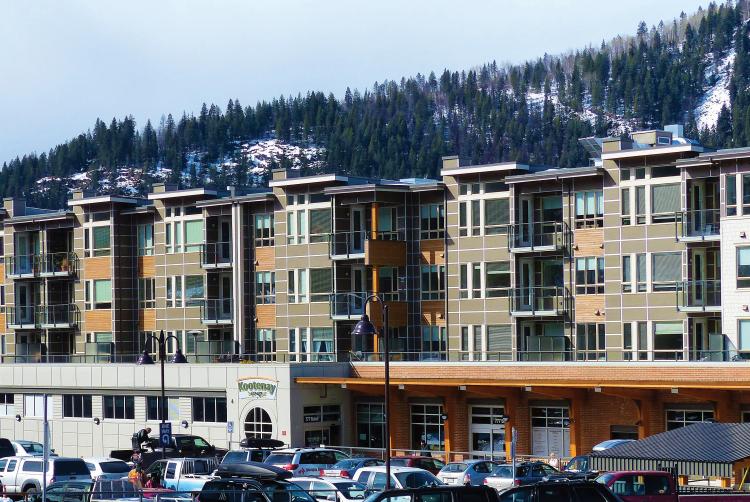
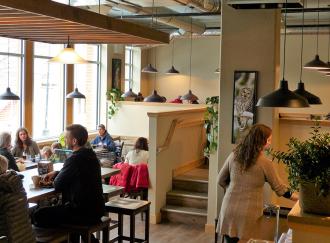
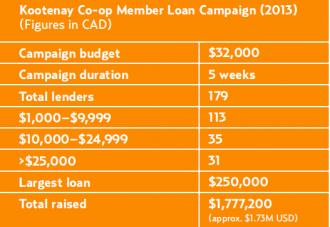
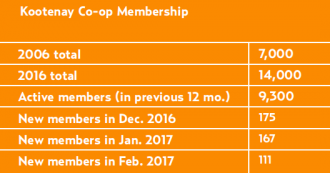
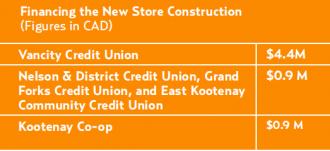
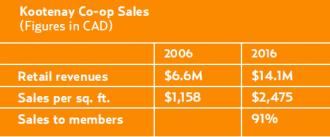
What do you love most about your new co-op? Since December 2016, I’ve been asking this question quite a bit of my fellow member-owners. The answers are becoming quite predictable:
“I can have my morning coffee at the co-op now!”
“Love the new hot bar and salad bar—best and most affordable meal in town.”
“We finally have a meat department!”
“Two shopping carts can pass each other in the aisles—hurrah!”
“We now have a parking lot!”
I like the last one best, although I agree it’s an odd answer to be fond of. Parking lots, after all, are not the most celebrated of places. There really isn’t anything charming about a parking lot. And yet, I can say unequivocally that the 47 parking spaces adjacent to the new Kootenay Co-op comprise the most exciting and important parking lot I have ever known.
A thriving but cramped downtown
My hometown of Nelson, British Columbia, is small—only 10,230 people. But Nelson is a commercial center for 25,000, and more than half of the town is built on the side of a mountain. These two factors make motorized transportation a popular feature of Nelson’s historic and bustling downtown and make the challenge of finding parking among the great topics of conversation at Nelson coffee shops.
First-world problem, right? Indeed.
But...when trips to the grocery store often result in the heaviest of loads of any shopping experience, the absence of a parking lot is not only an inconvenience to members, it’s also a liability to a grocery store’s success—particularly in the age of competition from chain retailers that now carry the same products that were once characteristically “co-op.” Parking matters!
After 42 years since the co-op’s founding and 25 years in an increasingly crowded store with no parking, we now have a parking lot! It didn’t come cheap, though. The land alone for the new parking lot cost us $3.5M (USD) in 2012. The construction cost: $27M! Thankfully, the developer threw in a few perks—including a breathtaking 21,000 sq. ft. grocery store with a 54-seat café; a 1,900 sq. ft. commercial kitchen and meat department; 54 condominiums; 8,000 sq. ft. of additional commercial space; and the best chocolate croissants in town.
It was great working with such a cooperative and generous local developer who cares so much about food. That developer was Kootenay Co-op!
We named the project Nelson Commons and in 2015 broke ground on what would become Nelson’s largest and most significant commercial development in recent history. For 2015, the Nelson Star called the Kootenay Co-op, “Newsmaker of the Year.” The former store closed for good in December 2016.
Co-ops: stronger together
It took a whole lot of courage to embark on such an elaborate project, but our confidence was boosted by the quality and integrity of the Nelson area community and the co-op’s member-owners, management team, staff, and board. In becoming the developer, the co-op was making sure that local and cooperative values would be represented at all stages of development.
Having little to no experience internally to map out a development of this scale, we hired the co-founder of Vancouver’s Capers Markets—an organic retail pioneer.
The co-op was successful in assembling the financing, but we could not have done it without the support of principle six—cooperation among cooperatives. Our lead partner was Vancity, Canada’s largest community credit union. Vancity stepped outside of its usual geographic service area to make our vision come to life. They saw our co-op as an inspirational case that could send ripples throughout Canada’s cooperative community. Canada, after all, has very few natural food consumer co-ops—Kootenay Co-op is the largest in the country. Vancity hoped the success of the Kootenay Co-op would inspire more like it.
Local credit unions also played a role. The four largest in the region either loaned or invested in Kootenay Co-op.
None of this would have been possible, however, without the support of member-lenders. The early show of commitment in 2013 by 179 members, who lent $1.78M, communicated a strong message to our hopeful financial partners—our community was behind this project completely. This was particularly important assurance for Vancity, which had no previous direct experience with our community or cooperative.
Selling condos
No question that among the greater community of food co-ops, our new parking lot is far from headline news. On the other hand, a food co-op marketing, developing, and selling 54 condominiums—that’s unique!
When I first joined the board in 2006, I never imagined that my role would eventually involve sipping wine in a condominium showroom whilst entertaining city councilors, local architects, and prospective condo owners.
Of the 54 condominium units, as of March 2017 only five remain unsold.
The co-op’s decision to construct residential units rather than a stand-alone store was twofold:
1. Any profits from the sale of condos could be directed back to the co-op and thereby kept within the community.
2. The land and building we purchased in 2012 is prime downtown real estate. Maximizing the use of that block through urban density would bring more life and more commerce to a community whose downtown is more active than its shopping mall. It felt like our civic duty not to simply build a big box.
In the long term, the co-op will remain a grocer, not a condo developer. As soon as possible, the co-op will take off its developer hat and focus on what it knows best—good food. The co-op, now Nelson’s largest non-governmental employer, will also strive to become a community model of a healthy, fun, and equitable workplace.
Ripples of possibility
The aspirations for how this new and expanded store will send ripples throughout the greater community are not unlike those that compel any food co-op expansion or relocation. At Kootenay Co-op, two overlapping areas excite me the most for our post-relocation potential: our True Local program and the co-op’s impact on the regional economy.
True Local: In 2013, Canada’s food regulator introduced a literal expansion of what could be defined as “local.” “Local,” it was announced, would be permitted for use on any foods produced within the province and from no more than 50 km. across a provincial border.
This did not sit well with our co-op. British Columbia is one massive province! For us, “local” always meant from within our region—no more than a 1.5 hour drive in any direction. Our competition on the other hand wasted no time to begin marketing swaths of products as “local” despite coming from nowhere near our regional food community. In response, the co-op launched the “True Local” program.
What started as a labeling initiative has since expanded into a program providing direct support and mentoring to existing and aspiring local food suppliers. With a part-time coordinator hired in 2015, True Local has dramatically expanded the co-op’s impact on our local economy. Now, with our new store and wider shelf space plus easier access, the co-op’s potential as a local food economic engine has been significantly amplified.
In our previous fiscal year (ending May 31, 2016) the co-op’s True Local program had 138 suppliers and 52 farms. Payments to these suppliers totaled $3.46M (37 percent of cost of goods sold), and payments to the farms totaled $2.05M (22 percent of cost of goods sold).
Keeping more grocery dollars in the local economy
Within Canada’s grocery retail sector, Nelson is a microcosm of the wealth and power that has been amassed in a country with one of the most concentrated grocery retail markets in the world.
The three largest chain stores operating in Nelson are Canadian grocery heavyweights: Loblaw (Toronto) and Empire (Nova Scotia), which combined account for 47% of national grocery sales, and Overwaitea (Vancouver), Western Canada’s largest. It’s no surprise that behind these companies are three of Canada’s wealthiest people or families (2016 national wealth rank in parentheses): Loblaw’s Galen Weston (#2), Overwaitea’s Jim Pattison (#4) and Empire’s Sobey family (#21).
There’s big money in big food. But there’s an alternative.
Tucked away deep in the interior of B.C., Nelson’s isolation from western Canada’s two primary food distribution centers (Vancouver and Calgary) makes the importance of preserving and growing our local food economy critical—and the impact of our food dollars all the more tangible.
The co-op represents an opportunity for Nelson and area residents to keep food expenditures from leaking out of the region and ending up in the hands of Canada’s uber-wealthy grocery tycoons. Our new store, with its nice new parking lot, wider aisles, and greater variety on the shelves, is a renewed invitation to everyone in our community to consider how their food dollars impact their families and neighbors. Kootenay Co-op, with its new store and True Local program, is an invitation to our community to participate in reversing the growing rates of wealth inequality in this country. It’s an opportunity to be an example of how the notoriously struggling towns of rural B.C. can look to local food as a sustainable and flavorful economic development opportunity.
Can I interest you in a condo? ♦
See PDF for more data from Kootenay Co-op







